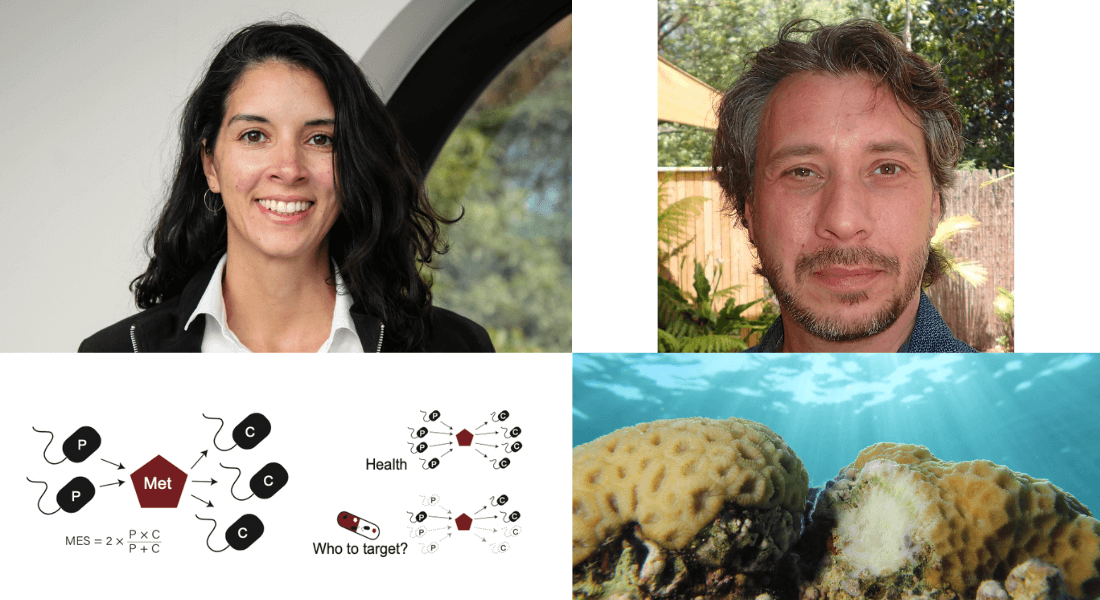Two Holobiont Talks

Center for Evolutionary Hologenomics invites everyone interested for a double seminar on Wednesday April 26th from 11-12. We will be treated with exotic tales involving how the use of community-wide metabolic modelling can help unravel microbial interactions, as well as a tour into one of the most fundamental holobiont models – the coral and how hologenomics can help us understand outcomes of coral bleaching events.
Talk 1: By Vanessa Rossetto Marcelino; Title: “Unravelling Microbiomes”; Abstract & Bio below
Talk 2: By Heroen Verbruggen, Title: “Evolutionary and ecological genomics of phototrophic symbionts” ; Abstract & Bio below.
Talk 1: Unravelling microbiomes by Vanessa Rossetto Marcelino
Abstract: Microbiome engineering has been in the spotlight as a potential solution to maintain or improve the health of several hosts, from threatened coral species to livestock and humans, but the development of microbiome manipulation strategies has been slow. Part of the problem is that it is still challenging to identify a significant fraction of microbial species and their ecological roles within host-associated microbiomes. This seminar will focus on the current challenges and advances in characterizing microbiomes from taxonomic and functional perspectives. Focusing on the human gut microbiome, I will discuss how charting microbial interactions with community-wide metabolic modelling is helping to identify promising strategies to restore a healthy gut ecosystem.
Bio: Vanessa Marcelino is a new group leader at the University of Melbourne working at the interface between microbial ecology, evolution and bioinformatics. She has used a range of model systems to investigate the spatial and functional distribution of organisms, from frogs (BSc in Brazil) to seaweeds (Erasmus Mundus joint MSc in Germany/France/Belgium), microalgae (PhD Australia), and human-associated microbiomes. As a postdoc Vanessa established new bioinformatic methods to study pathogens within microbial communities (University of Sydney) and to identify metabolic interactions disrupted with disease. Vanessa currently holds a cross-faculty appointment within Melbourne Integrative Genomics and the Peter Doherty Institute at Melbourne University. Her team focuses on the ecology of microbial networks, tackling both applied challenges in the development of therapies and microbiome engineering, and fundamental questions on the eco-evolutionary processes underlying biological interactions.
Talk 2: Evolutionary and ecological genomics of phototrophic symbionts by Heroen Verbruggen
Abstract: My seminar will summarise the main findings of two studies from my team, spanning the fields of algal evolutionary biology and coral holobiont functioning. The first case study will focus on the molecular evolutionary dynamics during endosymbiosis events. Using three evolutionary replicates, we study the genomic signature of molecular processes acting through secondary plastid endosymbiosis – the origination of a new plastid from a free-living eukaryotic alga. We show tightly constrained trends of relaxation of selection and identify the commonalities and variability of this process among endosymbiosis events. My team's work on coral biology has focused on the structure and function of the rich microbiota living in the coral skeleton. I will introduce this intriguing system and its eclectic range of photobionts. Using 2D chemical imaging, we characterised the oxygen and pH gradients present in the skeleton, and through micro-sampling, metagenomics and metatranscriptomics, we inferred the link between the microbiome and its spatially structured environment. We are currently working towards bringing these various pieces of information together into an overall model of microbiome structure and function, and are taking steps towards understanding how processes playing out in the skeleton affect how corals fare during bleaching events.
Bio: Heroen Verbruggen is an Associate Professor at the University of Melbourne. His team works on evolutionary and ecological genomics of algae and complex autotrophic holobionts, aiming to understand how these organisms function, interact with each other and their environment, and have evolved. A broad interest in algal biology leads his team to do a range of work including biodiversity, genome biology, photophysiology and evolutionary biology. The team's coral holobiont work integrates chemical imaging, meta-omics techniques, metabolic modelling and experimental manipulations to better understand energy acquisition and metabolic exchanges among holobiont members. Bioinformatics and genomics are key skills in his team, and the group has developed several publicly available computational tools for environmental microbiology, phylogenetics and genomics. https://hverbruggen.github.io/
The seminars will take place in auditorium CSS Aud. 7.0.18, which is just two floors below on the ground floor of our building KH-7.
